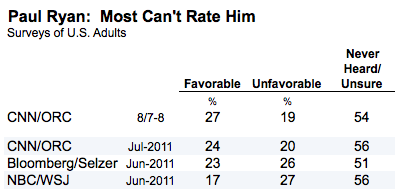Not surprisingly, Paul Ryan is unknown to the US public, let alone the details of his plan. The race is now on between the GOP and the Democrats to define him.
Americans have been polled on the Ryan Plan without naming it.
At about the same time, a national USA Today/Gallup poll of Republicans found that just over two thirds (68 percent) said they did not know enough about Ryan's proposal to have an opinion on it. Most Republicans with an opinion (24 percent) favored the plan, while 8 percent opposed it.But as favorable to the Democrats as this seems, it is far from cut and dried, as the rest of the post shows. Finally there is credibility.
However, some media pollsters asked about the substance of the plan and found net negative reactions among those willing to venture an opinion. In June 2011, for example, a NBC/Wall Street Journal poll posed the following question to Americans:
There is currently a proposal to change how Medicare would work so seniors being enrolled in the program ten years from now would be given a guaranteed payment called a voucher from the federal government to purchase a Medicare approved coverage plan from a private health insurance company. Do you think this is a good idea, a bad idea, or do you not know enough about this to have an opinion at this time?
Although nearly half said they had no opinion or were unsure (47 percent), more considered it a bad idea (31 percent) than a good one (22 percent).
Similarly, a CNN/ORC International poll conducted in May 2011 found that 58 percent of Americans opposed "the Republicans' plan to change Medicare" based on what they had heard or read, while just 35 percent said they supported it and 7 percent were unsure. Given the lack of familiarity gauged by other polls, the CNN result likely says more about suspicion of congressional Republicans on Medicare than awareness of the bill itself (the previous question on the same survey found that 48 percent preferred President Obama's approach to Medicare to 39 percent who preferred the approach of the Republicans in Congress).
A bigger challenge for Democrats may be how to make these arguments believable to true swing voters. Last month, The New York Times reported on a set of focus groupsconducted in late 2011 by the pro-Obama super PAC Priorities USA, in which participants were informed that "Romney supported the Ryan budget plan — and thus championed 'ending Medicare as we know it' — while also advocating tax cuts for the wealthiest Americans." According to the Times report, the attacks had little impact. The participants "simply refused to believe any politician would do such a thing."The Huffington Post
Paul Ryan Is Still Unknown, Has Vulnerable Budget Plan, Polls Show
Mark Blumenthal

Has any VP made a decisive difference in the outcome of a race since 1960 ?
ReplyDeleteThe sad thing is that the important issues -- the endless wars, the eroding civil liberties, the depression -- are being ignored while we debate which candidate's austerity plan we like the best.
Has any VP made a decisive difference in the outcome of a race since 1960 ?
ReplyDeletePalin?
All the Ayn Rand stuff is going to be dredged up (very dark), the Catholic Church will probably re-engage (and not in a positive way for Romney-Ryan), dinners with hedge fund managers sporting not one but TWO $300 bottles of wine (who knows what else)... this pick is a disaster...
ReplyDeletersp,
Palin may have been a positive -- with the conservative base. My conservative friends love Palin, but never had much enthusiasm for McCain.
ReplyDeleteLikewise, Ayn Rand is a rock star within the conservative base.
There are 2 opposing theories on how to win an election.
The convention wisdom, still practiced by Democrats, is to appeal to the center.
The Karl Rove theory is that there is no center. The country is polarized, about 50% liberal and 50% conservative. Victory goes to the side that energizes its base and gets them to show up to the polls. Bonus points if you can disenfranchise the other side's base.
Whether Ryan hurts or helps or even makes an iota of difference this year remains to be seen. But so far the Republicans are operating by the Karl Rove handbook, which has worked well for them in the past.
So ... whose austerity deficit reduction plan do you like best ? ;-)